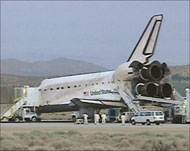Russia looks to fill space travel gap
The grounding of US space shuttles has left Russia with a temporary monopoly on manned flight to the International Space Station (ISS), and officials in Moscow are crowing that whatever their cosmic taxis lack in frills they make up for in high reliability and low cost.

Mincing few words, space officials say Russia can make three manned flights to the ISS between now and February if needed, but they make clear that they expect the United States to foot the bill for any missions made necessary by scrapping of planned shuttle flights.
Their price? $65 million – a fraction of the more than $500 million for an average shuttle mission – according to Alexei Krasnov, head of the Russian Space Agency’s manned spaceflight program.
For that money, a paying customer would get a Soyuz rocket, the workhorse of Russian space transport, and all accompanying launch, mission supervision and return-trip services.
“We hope that American shuttles will resume regular flights, and we are offering our NASA colleagues the use of Soyuz as a rescue spaceship,” Krasnov said on Thursday at an aerospace trade exhibition outside Moscow, a trade show that underscored Russia’s prowess in space exploration.
Russian and US space officials were planning to hash things out in the coming weeks, taking into account the disruption to the US shuttle mission schedule, Krasnov said
Russian help
|
“We hope that American shuttles will resume regular flights and we are offering our NASA colleagues the use of Soyuz as a rescue spaceship” Alexei Krasnov, |
Russia was prepared to consider a variety of scenarios. “Our counterparts from NASA will visit us late August or early September, and we will then discuss what services Russia can provide to deliver cargoes and crews, and on what terms,” Krasnov said.
Although China launched its first manned space mission in 2003 and is reported to be preparing for a second mission, possibly as early as October, Russia and the United States are at present the only powers that ferry humans to the ISS.
But NASA announced on Thursday that it was grounding its shuttle fleet until at least March after a mishap on the latest mission, and some experts have speculated the US shuttles, central to the ISS project, could be mothballed for good.
Even if US space officials conclude they need Russia’s help in space, Russian officials said, they may find themselves constrained by US law itself, specifically an amendment that bars US financial involvement in Russian space projects due to Moscow’s nuclear cooperation with Iran.
Space projects
Russia is looking beyond partnership with the United States for the future of its own manned space program, setting its sights on a range of state-funded and commercial projects, including a plan to send a rich space tourist to orbit the moon.
The country’s draft 2006 budget allocates more than 6.1 billion rubles (around $220 million) for the space programme, a meagre sum compared with NASA’s projected $9.6 billion 2006 budget, but nonetheless a 160% increase on this year’s Russian space budget.
In addition to financing Russia’s current space presence, some of those funds are earmarked for development of the country’s own space shuttle, the Clipper, a reusable manned space vehicle that Russia plans to launch in 10 years.
Like the US space shuttles, the Clipper is designed to carry people to and from space. Unlike the US space shuttle, it doesn’t pretend to be of use for anything else and is a fraction of the size, a fraction of the sophistication – and a fraction of the cost – of the US vessel.
Agreement obligations
 |
|
After Discovery’s recent mission, |
While US space planners wring their hands about what to do next, Russian officials have been telegraphing reminders that their ISS contractual obligations to NASA expire next spring and that ferrying Americans to space will not necessarily be a priority after that.
“Russia’s obligations to its US partners will end in the spring,” Krasnov said. “A Soyuz rocket will then take two Russian cosmonauts … to the ISS. The third place will be reserved either for a space tourist or for an astronaut from the European Space Agency.”
He said that although Europe does not have manned space vehicles, it is scheduled to launch its first ATV supply ship to the ISS early next year, signalling that international presence in space will be increasingly less reliant on the US program.
A Russian Space Agency source quoted by Interfax news agency said this month that ISS member states are planning to convene this autumn, possibly in Japan, to lay out plans for the space station in light of uncertainties about the US role in the project.